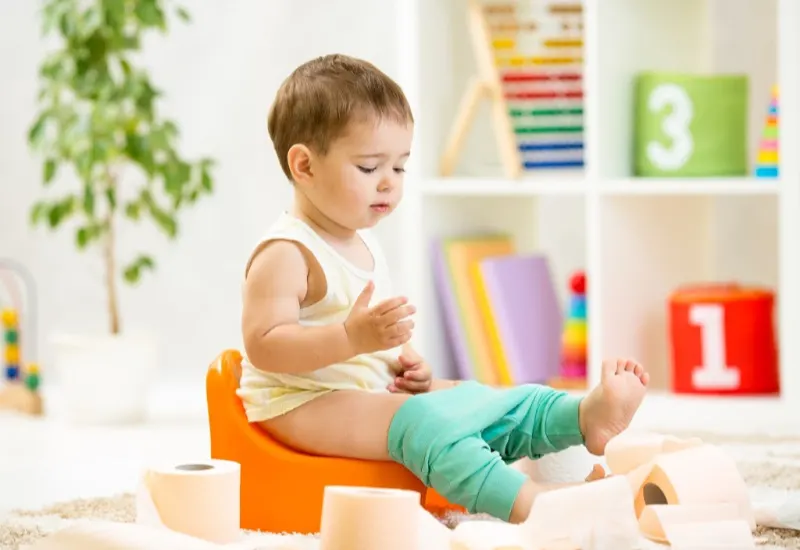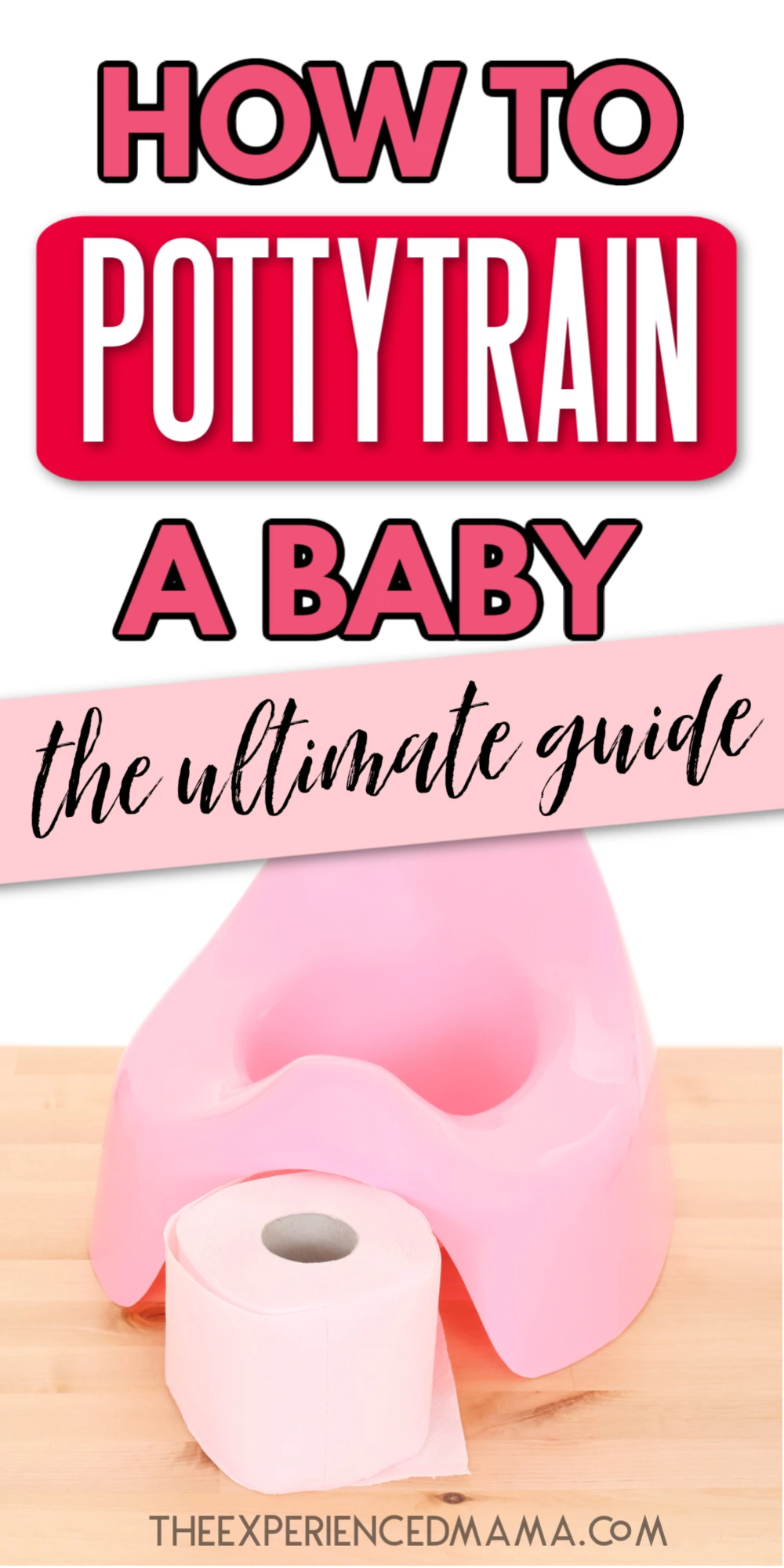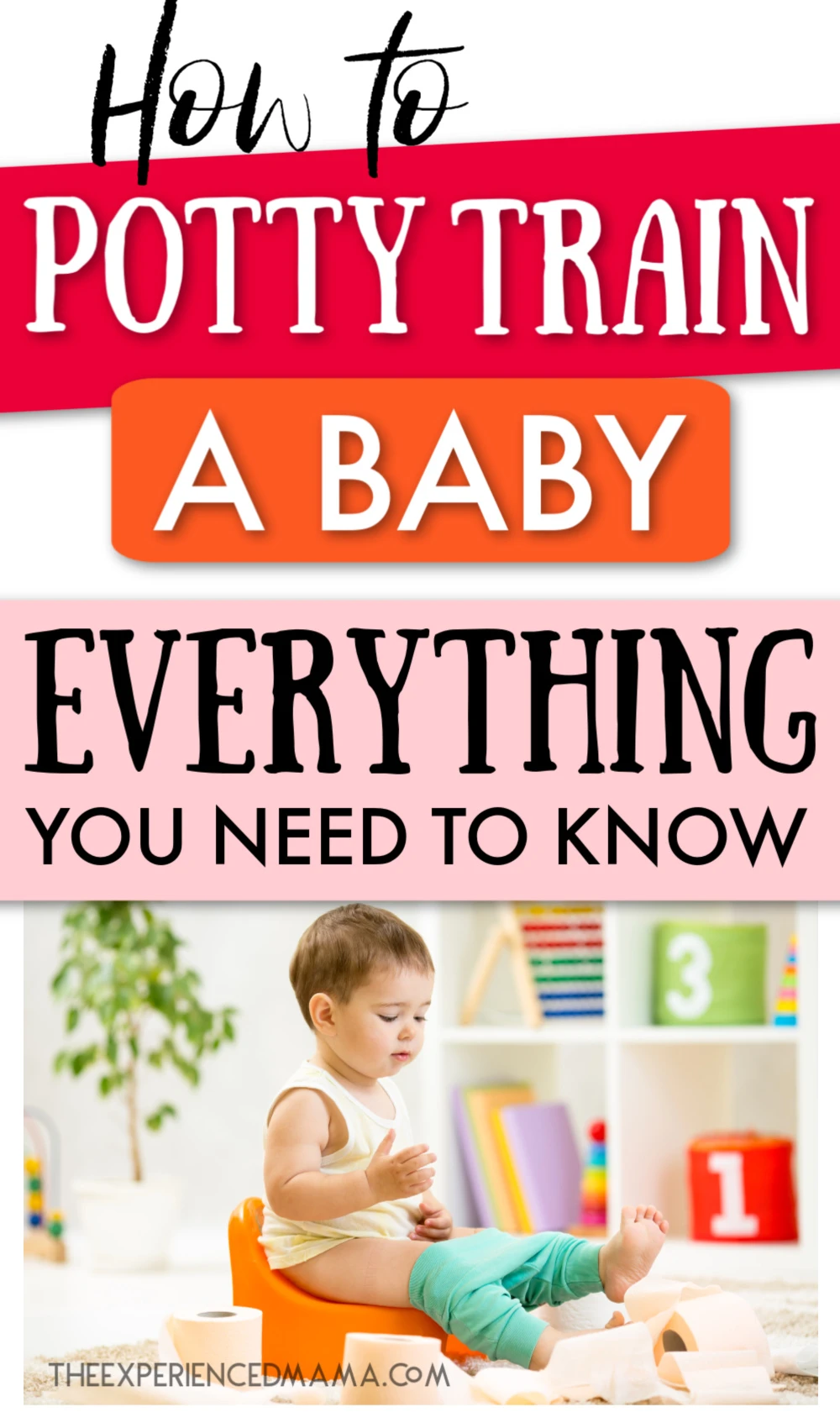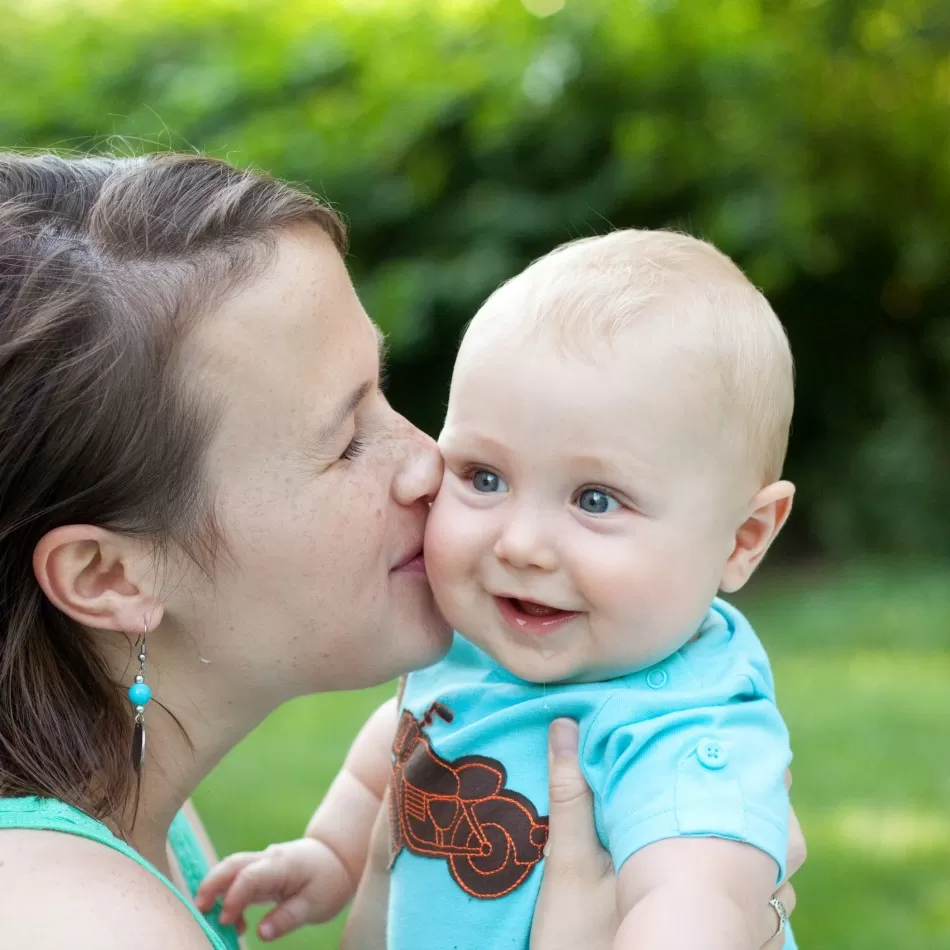Inside: A comprehensive guide for how to potty train a baby, including the pros and cons of early potty training. Get solutions to problems parents face during early potty training and answers to commonly asked questions.
Potty training is my very least favorite parenting task. I think it ranks even lower than the stomach bug (and that’s sayin’ something).
At least the stomach bug is temporary nastiness. Potty training can stretch out for weeks, and even months!
I absolutely detest cleaning up pee and poop off floors. Especially carpet. Did I mention we’ve rented through the birth of all five kids?
My second born (a boy) took six months to potty train. Two to three accidents a day. And even after he was “potty trained”, I’m still dealing with night-time potty training for that one…at age 7.
And my first child? She was finally potty trained after four attempts. Yes, four.
I don’t say this to scare you, but to help you understand why I started potty training my kids when they were babies.
I was fed up with traditional methods: the American pediatricians and parents who claimed potty training a baby was not only impossible, but even detrimental.
I knew there HAD to be a better way than our American (or western) way. So I turned to the internet and books to find that better way.
You Might Also Like: When Baby Cries After Bath – 13 Ways to Calm Them Faster!

The History of Potty Training (a.k.a when & why the West stopped potty training babies)
THIS POST PROBABLY CONTAINS AFFILIATE LINKS. AS AN AMAZON ASSOCIATE, I EARN FROM QUALIFYING PURCHASES. YOU CAN READ OUR FULL DISCLOSURE POLICY HERE.
The book that proved to be the most helpful in my quest for answers on how to potty train a baby was Diaper-Free Before Three. Learning the history of potty training in America helped me grasp why potty training is the way it is today.
Before 1950, the majority of children in America were potty trained sometime between 12 and 18 months.
Most women stayed home to raise their babies. They had time, and they had incentive. Changing and washing cloth diapers gets old, I’m sure.
Plus, cloth diapers don’t wick away moisture from those cute little bottoms. Babies could feel when they peed and pooped, and they let their mamas know.
With the invention of disposable diapers, everything changed.
And the marketing of those disposable diapers? Oh, the marketing.
Get this: they targeted women, claiming they could “free” them from needing to change diapers and potty train all day.
Those disposable diapers also solved the problem of babies feeling the effects of their waste elimination. They might cry when they initially urinate, and they will probably cry if a poopy diaper isn’t changed for a bit.
But disposable diapers are now so effective, there really is no incentive on either the part of the parents OR the babies to choose a different route.
The other key part about the history of potty training, in America at least, is that the creator of the signs of potty training readiness, Dr. Brazelton was – you’re not going to believe this – on staff with Pampers when he wrote them (source).
Who else has more incentive to keep kids in diapers longer than the manufacturers of disposable diapers?
And all of that, my friend, is why we don’t potty train babies anymore. Combined with our hectic, busy schedules, working mothers, and the convenience and effectiveness of disposable diapers, and there’s just no good reason to do so.
Or is there?
Even with the potential benefits, should we really potty train babies? I’m going to give you the pros and cons before you decide to give it a shot.
(You’re gonna want a copy of this book! I cannot promote it enough!)

The Benefits of Potty Training a Baby
There are definitely cons to potty training babies, but first I’ll give you pros.
1. Save Money
This is pretty self-explanatory.
Potty training babies gets them out of diapers sooner. The few diapers they use, the less you pay.
While you probably won’t kick diapers before 12 months old, you will get them out of diapers significantly earlier than their peers. You can save at least $400, but probably more.
2. Better Parent/Child Relationship
Having potty trained two kids traditionally and two kids as babies, I can tell you that potty training the traditional way makes your relationship with your child difficult.
For whatever reason, cleaning up a babies pee and poop just feels different. It’s acceptable, expected.
When my two-year-old, who can talk and walk, jump and play, decides to pee all over the carpet, I have a harder time being understanding and kind. Add power struggles into that (my older two are strong-willed), and you’ve got a recipe for disaster in what can potentially be a challenging time already – the “terrible” twos.
Potty training your babies can prevent that disaster.
3. More Natural Toilet Training
When you start potty training a baby, potty training is the most natural thing in the world. It’s as natural as introducing solid foods and learning how to eat.
Just as you learn when your baby is telling you she’s hungry, you can learn when your baby is telling you she needs to pee.
The problem with potty training late is your baby learns not to communicate with you about needing to pee. When your baby starts to ignore the feeling of a full bladder, and the need to empty it, you have to teach it later.
There’s also no bribery involved. Because the potty has always been a part of your baby’s life, and you encourage her with praise for success, she won’t need treats or toys.
4. Better Hygiene
When you chose to potty train babies, you eliminate a lot of the problems that come with keeping moisture close to their genitals for long periods of time: diaper rash, yeast infections, and other infections.
While my baby still has wet diapers, they are changed much sooner. She also goes farther between wet and dirty diapers than the typical baby.
The Cons of Potty Training a Baby
I believe the benefits outweigh the drawbacks, but you’ll have to decide for yourself. It’s only fair you know both sides before you start.
1. Exhaustion
When you’re first learning your baby’s cues, you will feel like you are running to the potty all.day.long. And maybe it’s just because I have multiple children, but it can be pretty exhausting.
There’s no manual for differentiating between a cry of hunger and a cry of needing to pee.
2. Increased Night-Waking
If your baby is starting to sleep for longer stretches, early potty training may interfere with that. She may start waking up more frequently when she becomes aware of the sensation of needing to pee.
You can choose not to take her to the potty in the middle of the night (I don’t), but she’ll still need to be nursed or soothed back to sleep.
3. Inconvenience
Once your baby learns how to communicate the need to pee or poop, she will probably try to tell you anytime that happens. This isn’t always the most convenient – like when you’re out of the house.
My personal opinion is a little inconvenience now is worth it in the long run, but you’ll need to decide for yourself.
What Do You Need to Start Potty Training a Baby?
Before you get started, you’ll need at least one potty chair, but you’ll eventually need to purchase an additional one to keep in the car.
You can use the type that sits directly on the potty (we have THIS one), but I wouldn’t advise it at this stage. You can transition later on around 18 months.
Your baby seeing the pee and poop in the potty is part of the process. It helps make the connection between the sensation of needing pee, actually peeing, and seeing the results in the potty.
I personally use and love this potty chair and have used it with all of my kids.
Eventually, you can purchase these underwear when you decide to be brave and ditch the diapers completely.
I keep my babies in diapers for a long time because I really hate cleaning up pee and poop.
When Should a Baby Start Toilet Training?
When do you potty train a baby? Well, the age at which you start is entirely up to you.
Some parents start from birth. I prefer to wait until they have at least some upper body strength and head control. That way, I’m supporting the baby on the potty instead of holding them up.
Typically, between 5 and 6 months, babies have enough core strength to get started with early potty training.
You don’t want to wait too long beyond that.
Once babies start crawling and walking, they have less patience for sitting on the potty. You want to train early enough that they learn to recognize the sensation of needing to pee, can give you cues and wait to release on the potty.
While they may regress slightly once mobile, trips to the potty will already be part of their “normal”.
Can a Baby Be Potty Trained at 6 months? At 9 months?
That all depends on how you define “potty trained”.
Some physicians and other potty training “experts” define potty trained as a child knowing when he needs to the bathroom, and being able to do so without any help.
Obviously, by that definition, the answer would be “no”.
I would argue that potty training is an ongoing developmental process, much like learning to crawl, or walk, or talk.
Babies take months to learn those things. They make gradual, consistent process.
Potty training can (and should) be the exact same way.
Sometimes, it can feel like a “two steps forward, one step back” kind of ordeal. But they WILL continue to move forward.
Can they completely abandon diapers by the age of 6 or 9 months? Not unless you are able to drop what you’re doing all the time to take your baby to the potty, or you like cleaning up messes.
If you’re going to potty train your baby from an early age, you need to stop thinking about it in a goal-oriented way with the end goal being “potty-trained.”
Instead, commit to an ongoing, much more natural potty-training process with your baby.

How to Potty Train a Baby
Hopefully I’ve answered all of your questions up to this point. Now to get into the actual how-to’s.
So how DO you potty train a baby?
1. Start by putting your baby on the potty immediately after waking.
Did you know that you physically cannot pee while asleep (source)? You need to be at least partially awake in order to release pee from your bladder.
With a small bladder, even if she pees during the night a couple of times, your baby will most likely need to pee immediately after waking up in the morning.
You can start with sitting on the potty 3-4 times a day, depending on how many naps your baby takes during the day.
Timing it right is important. If you don’t co-sleep, a video monitor can help alert you when your baby wakes up. She will likely empty her bladder within 5-10 minutes of waking, so you need to be on it!
2. When you take your baby to the potty, always say the same simple phrase.
Choose a phrase a stick with it.
I always say, “Time to go potty!” and walk to the bathroom. We use the same bathroom every time.
Eventually, she will start to associate those words with the sensation of needing to go pee. And then, she will associate sitting on the potty with releasing the contents of her bladder.
3. When she succeeds, smile and clap enthusiastically.
The best part about early potty training is there are no bribes needed.
All your baby needs is your praise and encouragement. Make sure to give her plenty of it!
4. Pay close attention to your baby’s cues.
This is a process and will take time. My baby becomes fussy, wiggly, screams and arches her back when she needs to use the potty.
My instinct at first was to feed her. When she started refusing the breast, I realized she was trying to tell me she needed to go potty.
As moms, we are mainly trained to recognize signs of tiredness or hunger. It will take a while for you to add that third box to your mental checklist of things your baby could possibly be communicating with body language and cries.
What should you stop using diapers and switch to underwear?
That is completely up to you. Personally, I keep my babies in diapers until I am confident accidents would be minimal.
You can switch to these underwear as soon as you see more signs of fully emptying the bladder at each potty session and your baby is going longer between visits to the potty while staying dry.
Troubleshooting Early Potty Training (Common Problems)
A few problems typically come up with potty training babies, and since potty training a baby isn’t mainstream, it’s SO difficult to find answers to these!
Here are problems I’ve faced with my own solutions.
Problem: My baby seems to give cues constantly, and she’s soooo fussy!
After successfully early potty training my third child, I decided to early potty train my fourth, too. I started earlier and hoped for more success, especially with peeing on the potty.
Unfortunately, I hit a rough patch where he was crying much more frequently than usual. He also started getting up in the middle of the night with dry diapers and screaming without peeing in the diaper OR the potty.
At the time, I was homeschooling and working 30-40 hours a week trying to get my business off the ground. I gave up instead of pushing through.
I regret that now that he is adamantly refusing to potty train at 3.5!
The exact same thing happened with my fifth baby. But this time, I decided to push through. I’d worked so hard for a month and a half that I didn’t want to give up so easily.
After a week or so, she stopped being so fussy during the day and started getting the hang of things. She also stopped waking up fussy at night and went back to sleep with nursing.
My theory is that the fussiness is related to learning something new.
With anything new developmentally, babies need to work harder to master the new thing, which leads to increased fussiness and exhaustion.
I’d encourage you to stick with potty training through the “messy middle” as I like to call it, and you’ll be glad you did.
Problem: Baby is doing great with potty training, but then all of a sudden seems to be regressing.
When your baby is learning something new besides peeing on the potty, she will probably regress slightly with potty training.
Right now, my baby is working very hard to learn how to crawl. She gets distracted and doesn’t give me cues as often as she used to.
Don’t worry about regression, and don’t stop taking your baby to the bathroom.
Put your baby on the potty upon waking, and consider adding a few consistent times throughout the day to take her to the potty.
Problem: Baby pees on the potty, but poops in her diaper.
For the longest time, my baby would wait to poop until she was put into her car seat.
Maybe it was the position of the seat? Habit?
I have no idea, but without fail, every time I put her in the car, she would blow out her diaper in that seat.
Catching poops in the potty didn’t come until after introducing solids.
Releasing pee and poop are completely different tasks with different ways to accomplish it. Baby will probably master one before the other.
With my third child, he mastered poop long before he mastered pee.
I didn’t change a poopy diaper after his first birthday! But he didn’t master peeing in the potty until just after he turned two.
I started early potty training later with him – not until he was ten months or so. At that point, he pooped once a day, at the same time each day, so it was very easy for him to learn how to poop in the potty.
Pay close attention to your baby around the time of day he/she usually poops. Put them on the potty as soon as you see signs of straining.
Problem: Your baby pees on the potty only to pee in her diaper ten minutes later.
It will take a while for your baby to learn how to fully empty her bladder. Even when she masters it, her bladder is small, so she will need to pee more frequently than a toddler or older child does.
Again, I wouldn’t expect to completely eliminate diapers before age one.
If you remove the expectation to be diaper-free in X amount of months, you’ll save yourself a lot of disappointment and frustration.
Is Potty Training Your Baby Really Worth Trying?
If I could go back, I would start potty training before six months old with all of my kids.
Does it take more work? Heck, yes.
Is it a pain in the butt sometimes? Yep.
But you know what’s MORE of a pain in the butt? Trying to introduce a walking, talking, stubborn as all get out two-year-old (or three-year-old in my current situation) to the potty after he’s gone his entire life NOT using one.
Call me crazy, but having tried the two-year-old route a few times now, I’ll take potty training a baby ANY day.
Your baby may not be fully potty trained before one, but I can almost guarantee that if you start early and stick with it, she’ll be potty trained before two for sure. And without the grief.
If you put the legwork in early on and start potty training your baby, you’ll be so glad you did!
Read Next: Keep Your Baby From Climbing Out of the Crib with These Proven Tips

Owner of Growing Serendipity, June could talk to you all day about homeschooling, parenting, and minimalism, which she does at This Simple Balance. When she’s not homeschooling, decluttering, or blogging, she loves to enjoy perfect silence while sipping a hot cup of coffee and thinking uninterrupted thoughts—which, of course, with five kids, doesn’t happen very often.
Sarah
Tuesday 26th of May 2020
Yes! Thank you for this post! I live in Vietnam so I ended up potty training my son around 18 months when all the Vietnamese grandmas at the playground would make comments (they potty train from birth mostly here). It was surprisingly not difficult and I really want to start much earlier this time around with baby girl :) Good thing we don’t have carpet! Thanks so much for the detailed tip.
June
Thursday 4th of June 2020
You're so welcome Sarah! I hope it goes as well for you as it did for my third. :)